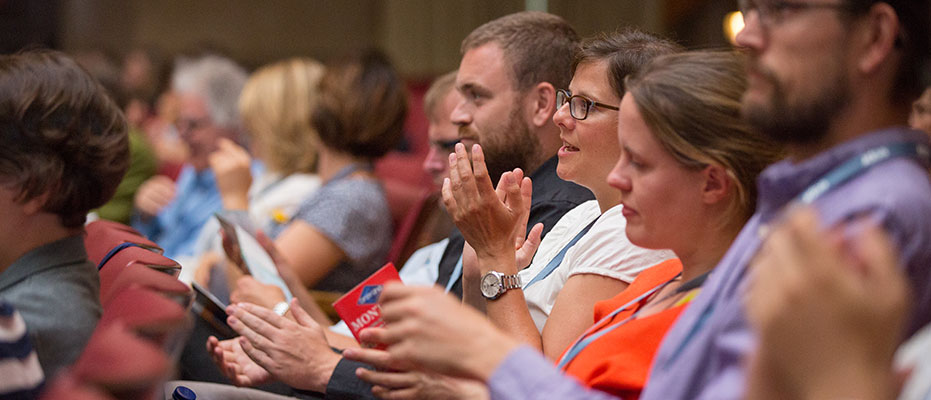Install this application on your home screen for quick and easy access when you’re on the go.
Just tap then “Add to Home Screen”

Monday 11 July, 17:30-18:30
Location: Aula
 |
Professor Christian Welzel, Leuphana University Lüneburg 'The Kantian Peace Reinvented: The Emerging Mass Basis of Interstate Pacifism' Christian Welzel is Professor for Political Culture Research at Leuphana University Lüneburg. He is internationally renowned for his work on value change and its effects on democratic development. Since 2008 he has been Vice President of the World Values Survey Association, and in recent years he has been Special Consultant to the Laboratory for Comparative Social Research at the Higher School of Economics, St. Petersburg/Russia. In 2014, Welzel was awarded the Stein Rokkan Prize for Comparative Social Science Research in acknowledgment of his path-breaking book Freedom Rising: Human Empowerment and the Quest for Emancipation (Cambridge). Alongside recent journal articles on generalised trust, political activism and women’s rights, he co-edited with Russell Dalton the 2014 volume The Civic Culture Transformed: From Allegiant to Assertive Citizens (Cambridge). Click here for Professor Welzel's homepage. This lecture demonstrates that inter-state peace is underpinned by an increasingly solid mass basis: representative survey data from around the world evidence a massive decline in people’s willingness to sacrifice their lives in war. To explain this finding, we test and confirm Evolutionary Emancipation Theory (EET). When improving existential conditions in a society turn most people’s lives from a source of threats to suffer into a source of opportunities to thrive, people adopt ‘emancipative values’: to allow themselves and others to take advantage of life’s wider opportunities, people increasingly support and tolerate universal freedoms. This emancipatory trend is most significant where the fixation of traditional survival norms on high fertility erected the strongest resistance against emancipation: reproductive freedoms. As a direct consequence of the emancipatory trend, people’s willingness to sacrifice their own and other people’s lives in war has dramatically declined. Hence, the emancipatory trend is a pacifist force that makes it increasingly difficult for government - especially in democracies - to find public support for waging wars. |
Roundtable 1
How to Get Published
Tuesday 12 July, 11:15-12:45
Location: Aula/Festive Hall, Main Building, Ülikooli 18
This roundtable will focus mainly on publishing in international academic journals. It will address issues such as how to choose a journal, how to deal with peer reviews, how to reckon with long delays. It will encompass both scholars who have published numerous peer-reviewed articles as well as those who have served as journal editors.
Speakers
Prof. Eiki Berg, University of Tartu: Professor of International Relations at the Skytte Institute of Political Studies. He has published nearly 30 international journal articles, including in Journal of International Relations and Development, International Studies Perspectives, Geopolitics, Nations and Nationalism, Cooperation and Conflict and Europe-Asia Studies. He will address differences in area studies journals vs disciplinary journals as well differences across sub-fields.
Prof. Christian Welzel, Leuphana University Lüneburg: Over the last 20 years Christian Welzel has published over 60 journal articles in a wide range of journals and in both English and German. He will focus on what it takes to get into the very top journals as well as cross-cultural differences in how publishing works.
Carlos Closa Montero, Research Area Director at the Global Governance Program, European University Institute, Professor Montero is co-editor of the European Political Science Review. He will speak on how a journal editor screens manuscripts, recruits reviewers and communicates with authors.
Roundtable 2
How to Write a Research Proposal
Tuesday 12 July, 16:30-18:00
Location: Aula/Festive Hall, Main Building, Ülikooli 18
The aim of this roundtable will be to provide advice on putting together research proposals, both for national and international funders. Where applicable, speakers will be asked to discuss different types of proposals: dissertation proposals, post-doc applications, project funding applications.
Speakers
Dr. Katrin Uba, Uppsala University: Associate Professor in Political Science. Her research focuses on protest mobilisation, social movement outcomes and the labour movement in Sweden and beyond. Her research has been funded by the Riksbankens Jubileumsfond, the EU’s FP7 programme, the Swedish Research Council and the Swedish Energy Agency.
Dr. Kristjan Vassil, University of Tartu: Senior Researcher at the Skytte Institute of Political Studies and Vice-Dean for Research and Development. A graduate of the European University Institute in 2012, he went on to obtain a post-doctoral position back in his native Estonia, where he has since applied successfully for five research grants, including most recently a one million euro grant to create a Center for IT Impact Studies.
Hector C. Pagan, University of Tartu: Lecturer at the Skytte Institute of Political Studies. For more than 20 years, Hector Pagan has written funding proposals in the US and Estonia. He has raised over €9 million, writing EU funding proposals in consultation with researchers and practitioners in a wide range of fields.
Roundtable 3
Russia and the West: What’s the temperature in the Baltics?
Wednesday 13 July, 11:15-12:45
Location: Aula/Festive Hall, Main Building, Ülikooli 18
This roundtable will feature a profile of regional politics by organizing a discussion of relations between Russia and the West from a Baltic point of view. How has the conflict in Ukraine played out in this region? How have these developments impacted on views toward the European Union and NATO? How do Baltic Russians feel about the current state of affairs? What is the place of the Baltic states in Russian-European relations: a precarious borderland, a security bulwark or an intermediary player?
Speakers
Dr. Piret Ehin, University of Tartu: Director of the Center for EU-Russia Studies and Senior Researcher at the University of Tartu. She has written on Baltic-Russian relations both in academic publications and policy reports for EU institutions.
Prof. Viacheslav Morozov, University of Tartu: Professor of EU-Russia Studies at the Skytte Institute of Political Studies. Before coming to Tartu in 2010, he was associate professor at St. Petersburg State University. Most recently he published the book Russia's Postcolonial Identity: A Subaltern Empire in a Eurocentric World (Palgrave Macmillan).
Brian Whitmore, Radio Free Europe/Radio Liberty: Senior Editor and Russia analyst for Radio Free Europe/Radio Liberty. He is the author of The Power Vertical Blog and The Power Vertical Podcast, both of which focus on Russian affairs. Prior to joining RFE/RL in 2007, Brian worked for eight years for the Boston Globe, first in the Globe's Moscow bureau and later as Central and Eastern European correspondent based in Prague. Before this he was a political correspondent and columnist for The Moscow Times and its sister publication The St. Petersburg Times.